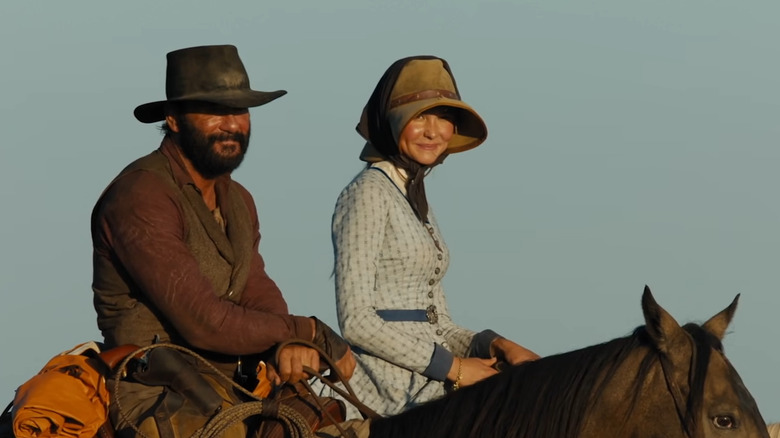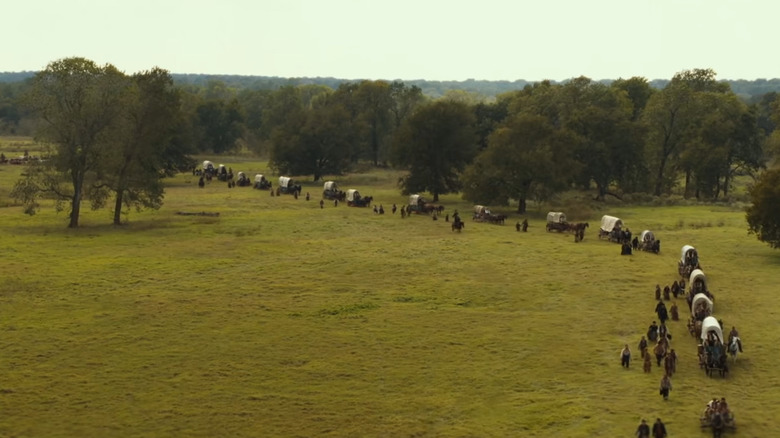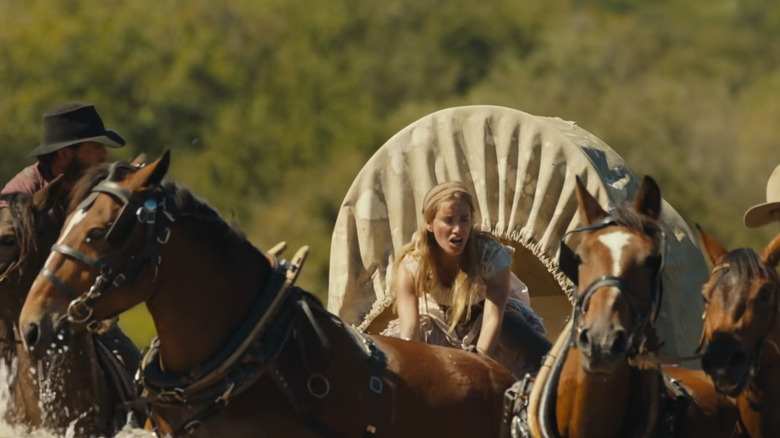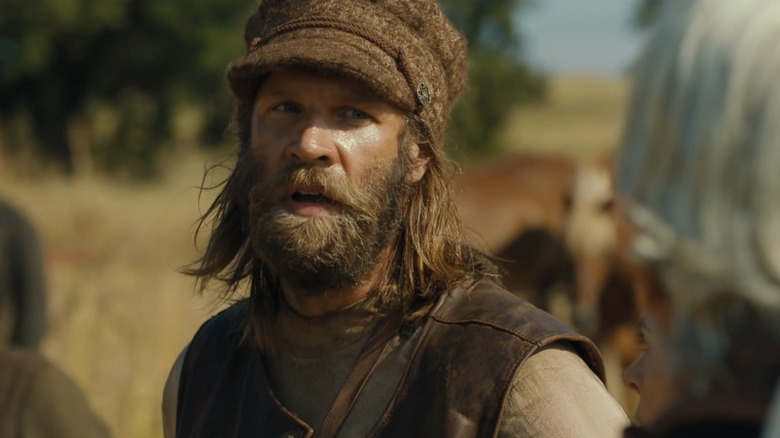Taylor Sheridan Hopes Yellowstone 1883 Sets Hollywood's Historical Record Straight
The following post contains spoilers for "1883."
The Taylor Sheridan Western drama "Yellowstone" is still going strong, and in late 2021, the prequel series "1883" premiered. In the present day, the central Dutton family has the largest ranch in Montana. Almost a century and a half before that, however, the Duttons were part of a group of people heading to Oregon to start a new life. They crossed America in covered wagons, facing the dangers of the trail, bandits, weather, disease, and so much more. Americans who lived on the East coast weren't the only settlers of the American West, though. In fact, many of those pioneering and brave people weren't American at all.
The limited series begins as James Dutton's (Tim McGraw) family comes to meet him on a train from their former home in Tennessee. They are escorted through the wilds of the West by Shea Brennan (Sam Elliott) and Thomas (LaMonica Garrett), two Pinkerton Agency members who know the land. It's a rough journey that no one is really prepared for, and it's indicative of what so many people went through to settle in the rapidly expanding country.
One of the reasons Sheridan wanted to make this prequel series was to set the record straight about who precisely these settlers were, according to an interview he did with the New York Times in December 2021.
'The pioneers have never been portrayed accurately'
When asked about why he decided to make the prequel series and set it so far in the past, Sheridan said:
"The pioneers have never been portrayed accurately. Many of the pioneers came from Central Europe, Eastern Europe and Asia, and they hired guides to take them West. They didn't speak the language. They'd never seen a horse. They'd never held a gun. And they had no idea that this land actually belonged to another group of people."
It was difficult enough for people who were prepared. Many of these immigrants couldn't understand the instructions they were given to survive on the trip because of the language barrier. Yet, they persevered and settled in the West. The ones that survived, I mean. They had no preparation. In one scene, we see them being hosed down and anyone with smallpox being turned out with nothing to go and die. (That is not an exaggeration. One man is told to take his wife and die together by the river.)
Later on, many of them had to leave all their possessions behind so they could cross yet another river. They're told that if they love their things so much, they can stay with them alone in the wilderness, but the wagon train won't wait for them. Many of them couldn't swim and drowned on the way. It was a rough trip, with threats at every turn. The main threat might not be what you were taught in school, though. Sheridan said:
"Native Americans were not the greatest threat to the wagon trains. If you look at the leading cause of death along the trail, No. 1 one was falling off the wagon. No. 2 was disease. No. 3 was bandits. Native Americans were, like, sixth."
'They saved up all their money, sold everything they had'
In "1883," most of this particular wagon train came from Germany, which leads to some cultural clashing. In a featurette that was posted on the series' official Instagram (now called "1923official" to reflect the second prequel series), Sheridan explained:
"Most people who went west saw ads in Croatia and in Poland and in Germany and answered those ads. America was unique in the fact that, wherever you were when you failed, you could simply move west to reinvent yourself. And reinvent your life. ... They saved up all their money, sold everything they had, hired the equivalent of a nineteenth-century travel agent who booked them passage on the ship, and got them to a group that would take them on these wagons."
That meant that when they were forced to leave their possessions behind on the trail, it indeed was everything they had. There were no phones or other ways of communication. Their loved ones back home might never see them again. No one prepared them for what they'd face until it was too late to turn back. It was essential to Sheridan to portray this accurately. He says, "History is doomed to repeat itself because it's never taught accurately. To be able to go back and look at a slice of time and study it accurately — it's truth through fiction."
'People dreamed of change and being free'
Marc Rissmann plays Josef, one of the immigrants in the series, who is struggling with exactly these issues. In the same featurette, Rissman explains:
"Historically, there was a lot of frustration in Europe if you wanted to own land ... there was a German immigrant who wrote letters about how beautiful Texas is and everything. And these letters were printed in a German newspaper. Many Germans at the time read them, and that was their decision to come ... people dreamed of change and being free."
These brave travelers took a huge risk with no idea of what they were in for. I recently spoke to Helen Mirren, who plays the sister-in-law of James Dutton in the upcoming prequel "1923," and even she was surprised by the vastness of America. She spoke about a trip across the country by train when she was in America doing theater in the 1960s. She said that she was stunned by a 12-hour stretch of land (and this is a train trip, not wagons) where there was just nothing out there: "I thought, 'Oh my God. People walked across this carrying their food, carrying their water. Women and men and children walked across this.'"
It's such a fascinating time period, and the decision to go west with no information was a massive leap of faith. It didn't pay off for everyone, but the stories that survived are incredible. It's a part of history that not everyone is aware of, and it will be interesting to see what other bits of the American story that we'll learn in the new series.
"1883" is currently streaming on Paramount+, with "1923" premiering on December 18, 2022.



